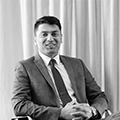Articles
Shavkat Mirziyoyev's first 50 days in power: Where is Uzbekistan heading?
Although there are some indications of potential changes to foreign and economic policy, there is little doubt that the new Uzbek leader will continue the tradition of his predecessor and preserve the authoritarian political system, writes Saif Islam.
The death of Islam Karimov, one of the longest-serving leaders in the former Soviet Union, on 2 September rekindled the succession speculation that preoccupied Central Asian observers for many years. What followed, however, indicates more continuity than genuine change. On 8 September, Uzbek parliament approved former Prime Minister Shavkat Mirziyoyev as the acting president. A week later, Mirziyoyev announced his candidacy for the December 2016 presidential elections, which he is expected to win. Mirziyoyev has been asserting himself in Uzbekistan’s domestic and international affairs since his ascension. The authoritarian system built by Karimov to protect the interests of Uzbek elites will most certainly remain, as Mirziyoyev is an integral part of this system. Nevertheless, his leadership to date offers some indications of changes in the foreign policy and economic spheres, albeit in a pre-election environment.
Karimov has ruled Uzbekistan with an iron fist for more than 25 years, ruthlessly suppressing political dissent and any potential threats to his power. Mirziyoyev, who has served as prime minister since 2003 but mostly kept himself out of the public eye, is believed to be similar to Karimov in terms of his personality and leadership style. According to some accounts, he is even tougher than Karimov. As a regional governor and then as prime minister, he has been instrumental behind Uzbekistan’s cotton harvest, an industry that reportedly involves forced labour in many instances and is routinely criticised by international human rights organisations.
Following his appointment as acting president, Mirziyoyev has moved quickly to carry out reshuffles in cabinet and regional leadership structures. Of these changes, the strengthening of Deputy Prime Minister Rustam Azimov’s portfolio has surprised some observers, given Azimov was previously seen as a successor to Karimov and thus, a potential rival to Mirziyoyev. Azimov’s responsibilities now reportedly include macroeconomic development, attracting foreign investment, structural reforms, managing national finances, education and science.
However, this is not entirely surprising in light of recent reports that the succession debate is not fully closed, and that Uzbekistan’s influential clans are currently engaged in power-sharing agreements. These reports indicate that while Mirziyoyev is most likely to become president in December, he will be sharing powers behind the scenes with Azimov and Rustam Inoyatov, Uzbekistan’s powerful security chief, long touted as another potential successor to Karimov. While Uzbek politics is incredibly opaque, it is likely that Mirziyoyev wants to accommodate other influential figures rather than alienate them, at least in the early stages of his reign.
The return of Abdulla Aripov as the deputy prime minister for youth policy, culture, information systems and telecommunications has also raised some eyebrows. He is a former deputy prime minister who was reportedly removed from government in 2012 following his involvement in a corruption scandal. He is, nonetheless, believed to be a long-time ally of Mirziyoyev.
These developments indicate that Mirziyoyev will continue Karimov’s authoritarian legacy and protect the interests of the Uzbek political and business elite. On the foreign policy front, Mirziyoyev has reiterated that Uzbekistan will continue to reject membership of regional military-political blocs. He also said that the country will maintain its isolationist stance, balancing its interests between the US, Russia and China.
However, in a break from the past, Mirziyoyev has taken important steps to improving ties with Kyrgyzstan and Tajikistan, countries with which Uzbekistan has had historical disputes over water, land and borders. For example, Mirziyoyev acted quickly to diffuse heightened tensions with Kyrgyzstan, by releasing four Kyrgyz nationals arrested by Uzbek security forces in August 2016 in a disputed territory. An Uzbek government delegation’s visit to Kyrgyzstan this month has also been hailed as a hugely positive development by high-level Kyrgyz leaders including President Almazbek Atambaev. Moreover, in late September, Uzbek foreign minister Abdulaziz Komilov visited Tajikistan to meet with Tajik President Emomali Rahmon, and discuss renewing bilateral economic relations following years of strained ties. Uzbek officials have also met with their Kazakh counterparts recently to resolve outstanding border issues between the two countries. These are important signs that Mirziyoyev will seek greater regional cooperation with Uzbekistan’s Central Asian neighbours than Karimov, even though the longstanding disputes will not be resolved immediately.
While it is too early to assess Mirziyoyev’s likely economic policy, his apparent willingness to focus on trade with regional neighbours likely signals a partial opening up of the Uzbek economy. Uzbekistan has been significantly affected by the global economic slowdown, plummeting commodity prices, and the recession in Russia. There are almost two million Uzbeks migrant workers in Russia, whose remittances have dropped significantly in the last two years. The country’s Gross Domestic Product (GDP) and average living standards have reportedly been falling over the past five years. In his first few weeks in power, Mirziyoyev has spoken about deepening “economic reforms” in order to stimulate the economy. He also promised to create thousands of new jobs, strengthen the private sector, build more homes, improve provisions of electricity and gas, and modernise transformation systems. To meet these objectives in the current, difficult economic climate, Uzbek leadership will have to enact some reforms.
While these potential changes should be welcomed, Mirziyoyev is effectively on a campaign trail ahead of the December elections, trying to shore up his popularity. There is every possibility that once he is formally elected, his positive forays into foreign and economic policies will experience a reversal. For now, Uzbek citizens can only hope that he implements some much-needed, comprehensive reforms not realised during Karimov’s reign.
